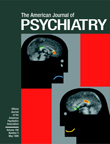Occult Gastrointestinal Bleeding With Anorexia Nervosa
Ms. A was a 16-year-old girl transferred to our hospital with a 3-year history of anorexia nervosa. Three months before her transfer, Ms. A had developed iron deficiency anemia (hemoglobin=7.6 mg/dl, ferritin=2 g/liter). Results of Hemoccult testing were positive, and a HemoQuant test result showed elevation at 11.5 mg hemoglobin/g of stool (0–2.0 normal). Ms. A had been hospitalized for 7 months, was within 5 pounds of her ideal body weight, and had not menstruated for 1 year. Symptoms included ritualistic and compulsive exercising but not surreptitious vomiting, laxative abuse, or other behaviors that could contribute to gastrointestinal blood loss.An upper gastrointestinal fluoroscopic examination, small bowel follow-through, barium enema, esophagogastroduodenoscopy, small bowel enteroclysis, proctoscopy, colonoscopy, abdominal CT scan, pelvic ultrasound, and a radioactive Meckel’s scan were all normal. The iron deficiency was considered to be of unknown etiology; Ms. A’s hemoglobin returned to normal with iron supplementation.Six weeks after admission to our hospital, Ms. A had hypochromic, normocytic anemia (hemoglobin=9.6 mg/dl) and had lost 12 pounds. Results of two of three Hemoccult tests were positive. Iron and ferritin studies were nondiagnostic.Records from the transferring facility and our hospital indicated that Ms. A was found running in place several times in her bedroom or bathroom. Upon questioning, she admitted to regularly running in place for at least 2 hours during the night.Running was discontinued, and Ms. A’s activities were intensively monitored. Results of six of six Hemoccult tests were negative over the following 2 months. Hemoglobin normalized with iron supplementation and an improved diet.
References
Information & Authors
Information
Published In
History
Authors
Metrics & Citations
Metrics
Citations
Export Citations
If you have the appropriate software installed, you can download article citation data to the citation manager of your choice. Simply select your manager software from the list below and click Download.
For more information or tips please see 'Downloading to a citation manager' in the Help menu.
View Options
View options
PDF/EPUB
View PDF/EPUBGet Access
Login options
Already a subscriber? Access your subscription through your login credentials or your institution for full access to this article.
Personal login Institutional Login Open Athens loginNot a subscriber?
PsychiatryOnline subscription options offer access to the DSM-5-TR® library, books, journals, CME, and patient resources. This all-in-one virtual library provides psychiatrists and mental health professionals with key resources for diagnosis, treatment, research, and professional development.
Need more help? PsychiatryOnline Customer Service may be reached by emailing [email protected] or by calling 800-368-5777 (in the U.S.) or 703-907-7322 (outside the U.S.).

